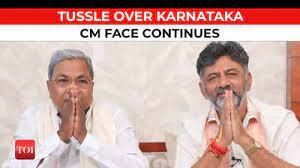As Karnataka eagerly awaits the announcement of its new Chief Minister, the Congress party finds itself facing a challenging decision. With the party high command in Delhi conducting multiple meetings, the focus is on choosing between two prominent contenders for the coveted position: Siddaramaiah and D K Shivakumar. Both leaders are currently in the national capital, engaging in discussions with Sonia Gandhi, the Congress President, and Mallikarjun Kharge, the veteran leader from Karnataka. The final decision regarding the Chief Minister’s post will be made after careful consideration of the opinions expressed by both leaders and taking into account the report submitted by the All India Congress Committee (AICC) observers.
The Congress party’s choice of Chief Minister holds significant implications for Karnataka’s political landscape and governance. Siddaramaiah, a prominent leader and former Chief Minister of the state, and D K Shivakumar, a seasoned politician and the President of the Karnataka Pradesh Congress Committee, bring their own unique strengths and experiences to the table. The decision is crucial as it not only determines the party’s leadership in the state but also impacts its future prospects in the upcoming elections.
Siddaramaiah, known for his astute political maneuvering and administrative acumen, has a strong base of support within the party and among the electorate. His previous tenure as Chief Minister from 2013 to 2018 was marked by several welfare programs and development initiatives aimed at uplifting the marginalized sections of society. Siddaramaiah’s leadership style is often characterized as assertive and pragmatic, which has earned him both praise and criticism. His ability to connect with the masses and address their concerns has been a key factor in his popularity.
On the other hand, D K Shivakumar, a prominent leader from the influential Vokkaliga community, is widely regarded as a strong organizational strategist. He has played a pivotal role in strengthening the party’s base in Karnataka and has a considerable following among party workers. Shivakumar’s political acumen and extensive network have been instrumental in managing the party’s affairs and ensuring its stability. Despite facing various legal challenges in recent years, he has managed to maintain his popularity and relevance within the party.
The Congress high command, led by Sonia Gandhi, holds the responsibility of carefully weighing the merits and capabilities of both leaders. Their decision will likely be guided by a variety of factors, including electoral prospects, social dynamics, and the ability to navigate the complex political landscape of Karnataka. Additionally, the report submitted by the AICC observers, who have conducted an assessment of the ground realities and public sentiment, will serve as a crucial input in the decision-making process.
Sonia Gandhi and Mallikarjun Kharge’s discussions with Siddaramaiah and D K Shivakumar will delve into various aspects, including their vision for the state, plans for governance, and strategies to strengthen the party’s position. The final decision will not only impact the immediate future of the Congress in Karnataka but will also shape the party’s trajectory in the long run. It is crucial for the Congress leadership to strike a delicate balance, considering the aspirations of both leaders, while also ensuring the unity and cohesion of the party.
The Congress party’s decision on the Chief Minister’s post in Karnataka is eagerly awaited by party members, supporters, and the general public. It will be a defining moment for the party as it seeks to regain its political footing in the state. The chosen leader will be entrusted with the responsibility of leading the government, addressing the needs of the people, and steering the party towards a path of resurgence and electoral success.
As the discussions and deliberations continue in Delhi, the political landscape in Karnataka remains charged with anticipation. The Congress party’s choice for the Chief Minister’s post will undoubtedly have far-reaching consequences, shaping the state’s future trajectory and determining the party’s


